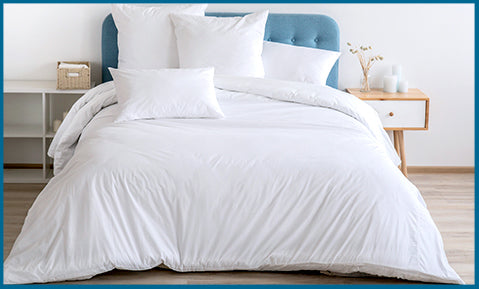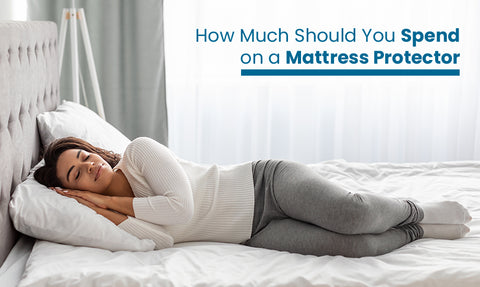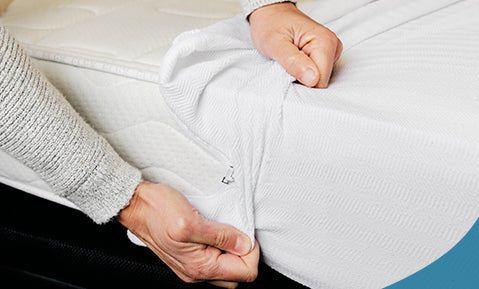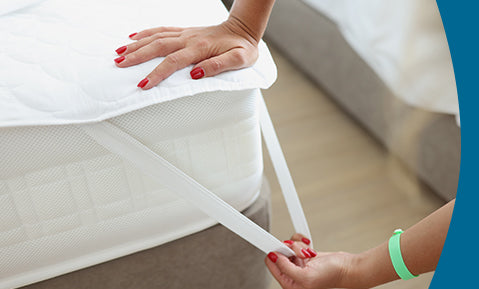
When we go to sleep, our body temperature decreases and muscles relax. Shivering and sweating are normal responses to body temperature: when we feel hot, our body sweats to cool itself down, and when we feel cold, our body shivers to generate extra heat.
Apart from room temperature, there can be many other reasons for shivering and sweating at night.
How do Shivering and Sweating affect your Sleep?
When we’re cold, our body shivers to generate more heat and warm us up. On the other hand, when we’re hot, our body sweats. When the sweat evaporates, it pulls away heat from our body and cools us down.
Both shivering and sweating are normal responses to aberrant body temperature.
Extreme shivering or sweating can wake you up, ultimately leading to:
- Sleep deprivation
- Excessive daytime sleepiness
- Irritability and anxiety
- Heightened emotions
Causes of Sweating at Night

Upon heating up, your body sweats so that the sweat can evaporate and pull heat away from your body.
Even though this cools your body down, excessive sweating can leave you drenched and interrupt your sleep.
Night sweats can have multiple causes including:
Infectious Disease
When fending off pathogens, such as bacteria and viruses, your body may heat up in order to kill the pathogens. Despite being a normal response, inflammation can raise body temperature, which causes excessive sweating.
Menopause
Menopause is a natural process that causes periods to end. Even though it isn’t a disease, it can present various physical and psychological symptoms.
Hot flashes and night sweats are common symptoms of menopause.
Medications
Certain medications can increase perspiration. Psychiatric drugs, such as antidepressants, are often associated with night sweats.
Some medications taken to lower fever can cause night sweats, medications including aspirin and acetaminophen.
If you’re experiencing night sweats from a drug, then discuss the same with your healthcare provider.
Also, night sweats can be a withdrawal symptom of quitting substances such as opioids.
Obstructive Sleep Apnea
Obstruction in the upper airway can lead to an inability to breathe properly. Such an obstruction may be caused by enlarged tonsils or the tongue slipping into the throat while sleeping.
People with obstructive sleep apnea experience the following symptoms:
- Loud snoring
- Gasping for air
- Interrupted sleep
- Noisy breathing
- Excessive daytime sleepiness
- Irritability
Obstructive sleep apnea is a serious medical condition that can lead to depression and heart disease.
Hormone Disorder
Certain hormone disorders can cause excessive sweating. Because of imbalance in hormones, your body may not be able to regulate temperature effectively.
Here are certain hormone disorder that may increase sweating at night:
- Hyperthyroidism: it occurs when the thyroid gland produces too much thyroxine, accelerating the metabolism of the body.
- Pheochromocytoma: non-cancerous tumor on the adrenal glands can alter hormone levels.
- Carcinoid syndrome: chemicals secreted by cancerous tumors can show many signs and symptoms, including night sweats.
Hypoglycemia
People who have low blood sugar may experience excessive sweating at night. Despite taking medications, night sweats can be a problem because the effect of medications wears off during the night.
Those who take insulin medications for diabetes are at a higher risk of developing hypoglycemia. Apart from this, the following can increase your risk of developing low blood sugar:
- Excessive exercise
- Extreme fasting and skipping meals
- Certain medications
Symptoms of hypoglycemia include:
- Hunger
- Blurred vision
- Pale skin
- Irritability
- Mood swings
- Fatigue
- Dizziness
- Sweating
- Tingling
- Problems with focus
- Seizures and coma
If you think that you have hypoglycemia, then reach out to a doctor, as this is a very dangerous condition.
Cancers
Malignant tumors can cause night sweats. Night sweats are often associated with the following types of cancers:
- Lymphoma
- Leukemia
- Carcinoid tumors
- Liver cancer
- Bone cancer
- Mesothelioma
Even though experts still don’t know why certain types of cancers cause night sweats, they hypothesize that the primary reason for this is your body fighting back.
If you get a fever because of cancer, then your body will heat up, leading to excessive sweating at night.
Cancer treatments, including chemotherapy, also cause night sweats.
Neurological Conditions
The following neurological conditions can cause night sweats:
- Autonomic dysreflexia: this can occur upon injuring your upper back or spinal cord. This condition is extremely dangerous and requires immediate medical attention.
- Posttraumatic syringomyelia: often caused by spinal cord injury, this condition leads to the buildup of cerebrospinal fluid in spinal cavities.
- Stroke: upon interruption of blood supply to a certain part of the brain, a person experiences a stroke, which is a medical emergency requiring urgent treatment.
- Autonomic neuropathy: in this condition, the nerves that control involuntary functions, such as digestion, blood pressure, and temperature control, get damaged.
All these conditions require immediate medical conditions.
Idiopathic Hyperhidrosis
If your doctor cannot find a particular cause for night sweats, then your condition is idiopathic, meaning that it has no known cause.

Causes of Shivering at Night
Firstly, make sure that the room temperature isn’t too low and that you use an appropriate amount of blankets to cover yourself if living in a cold environment.
If despite this you experience shivering at night, then the following causes may be possible:
Infection
Generally common to infections such as urinary tract infection, malaria, and pneumonia, chills are a natural response that help the immune system kick in faster.
Further, the shivering caused by contraction and relaxation of muscles increases your body temperature and enables your immune system to fight off the infection.
Menopause
As it causes many hormonal changes in your body, menopause can cause both sweating and shivering. Chills caused by menopause often follow hot flashes.
Drug Withdrawal
Shivering may be a symptom of drug withdrawal. Upon reducing or eliminating the usage of an addictive drug, people generally experience the following symptoms:
- Irritability and depression
- Changes in appetite
- Mood swings
- Muscle pain
- Shivering or sweating
- Tremors
- Vomiting
Shivering is a very common symptom of opioid withdrawal.
When quitting an addictive substance, you should consult a doctor so that you may experience minimum side effects, which can even lead to relapse.
Tips to Reduce Sweating or Shivering at Night
Night sweats or chills can interrupt your sleep and wake you up, leading to excessive daytime sleepiness, irritability, and even depression.
So you must take measures to reduce your symptoms to enjoy a good night’s sleep.
Here are a few tips to help you with the same:
Adjust the Room Temperature
If you experience excessive sweating, then lower the temperature of your room.
If you experience shivering, then increase the temperature of your room and cover your body with blankets.
While the ideal room temperature for sleep is around 65 degrees Fahrenheit, you should adjust the temperature of your room to minimize your symptoms.
Get Cooling Gel Pillows
Cooling gel pillows often come with a memory foam fill. While traditional pillows retain body heat and later pass it back to us, cooling gel pillows don’t.
And the memory foam fill adjusts so that your neck is properly supported.
Follow Good Sleep Hygiene
Since your sleep may be interrupted by such symptoms, you need to follow good sleep hygiene to improve the quality of your sleep.
To do so, you can employ the following tips:
- Wear breathable clothes: Even if you’re shivering, it is good to wear breathable clothes to your bed.
- Relax your mind: you can relax your mind by meditating for a few minutes. As your mind relaxes, your body will too, and you’ll drift off into sleep.
- Exercise regularly: exercise everyday in order to tire out your body and get to a healthier weight.
- Journal: by simply journaling your thoughts and exploring them, you can decrease stress and anxiety.
- Follow a sleep schedule: a sleep schedule is an important part of your sleep hygiene. Following a schedule will help your body in forming the habit of sleeping at a particular time.
When to see a Doctor
If your symptoms persist after a few days even though you’ve adjusted the bedroom temperature, then you should consult a doctor, as shivering or sweating may be caused by an underlying medical condition.
Conclusion
Sweating or shivering at night generally resolves on its own in a few days. However, if it persists or accompanies other symptoms, then you must seek help from a certified medical professional. Also, you can use the tips in this article for some relief from these symptoms.












